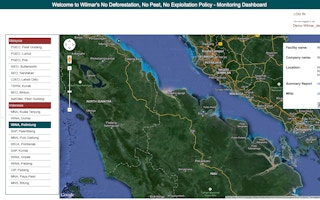The world’s largest palm oil trader Wilmar International has published the names and locations of its suppliers in its Indonesian and Malaysian palm oil supply chain - the first to do so in the industry - in a bid to raise transparency levels and address deforestation.
To continue reading, subscribe to Eco‑Business.
There's something for everyone. We offer a range of subscription plans.
- Access our stories and receive our Insights Weekly newsletter with the free EB Member plan.
- Unlock unlimited access to our content and archive with EB Circle.
- Publish your content with EB Premium.
The Singapore-listed company on Thursday launched a new website it calls the Wilmar Sustainability Dashboard on the sidelines of the World Economic Forum in Davos, Switzerland, which lists all its palm oil mill suppliers in the two Southeast Asian countries which produces the bulk of the world’s palm oil.
In addition to mill locations and supplier details, Wilmar’s dashboard also contains information on how grievances raised by stakeholders are being handled and the company’s efforts at engaging communities and implementing its sustainability policy.
Environmental groups have welcomed Wilmar’s initiative, with some calling it a “gentle revolution” that would accelerate the industry’s transformation to a more sustainable one.
Illegal deforestation, burning of peatlands, haze pollution in the Southeast Asian region, and violation of indigenous and labour rights are some common issues that have plagued the multibillion-dollar industry, which continues to expand rapidly every year.
Glenn Hurowitz, chairman of global anti-deforestation campaign Forest Heroes, said that “no agricultural producer has ever aimed for this level of transparency at this massive scale”.
Wilmar’s dashboard, developed in collaboration with global non-profit The Forest Trust (TFT), includes a map showing the locations of Wilmar refineries in Indonesia and Malaysia, and the names and locations of all the mills supplying to that refinery.
Jeremy Goon, Wilmar’s chief sustainability officer, told Eco-Business that the microsite is a significant milestone that not only furthers the company’s transparency efforts, but also helps it focus on matters critical to transforming the palm oil industry.
“The Group is on track to achieving our aspiration to delink our entire supply chain from deforestation and human rights abuse by end 2015,” he said.
Wilmar’s move follows a year of efforts by various players in the palm oil sector to bring greater transparency and traceability to an industry that has long been linked with illegal deforestation and labour rights abuses., burning of peatlands, and violation of indigenous and labour rights.
Palm oil and consumer product companies alike have in recent years pledged to stop sourcing palm oil that had been grown on illegally deforested land. These include Wilmar International, Golden Agri Resources, Cargill and Apical, Unilever, Procter & Gamble and Nestle.
Wilmar adopted a ‘No Deforestation, No Peat Development, No Exploitation’ policy in December 2013, shortly after environmental group Greenpeace published a controversial report pinpointing the company as a key culprit behind the habitat destruction of Sumatran tigers due to illegal deforestation and peatland burning in Indonesia.
The report, titled ‘License to Kill’, was rebutted by Wilmar, who at that time said they were undergoing a review of their business practices with international supply chain experts.
Scott Poynton, founder of TFT, told Eco-Business that TFT had worked on this initiative from about a year ago and that the accuracy of the information on the dashboard was “very high” and a “true reflection of where Wilmar sources”.
Greenpeace, who in December 2013 cautiously welcomed Wilmar’s sustainability policy, also praised the company’s new initiative.
Suzanne Kroger, a palm oil campaigner at Greenpeace, said the NGO was “very supportive of the fact that Wilmar is making transparency a key element of the implementation of their policy”.
Forest Heroes’ Hurowitz added: “Wilmar is setting the standard for responsibility in commodity production and I hope its competitors will soon join them”.
Meeting the demands of increasingly sustainability conscious consumers who expected their food be grown in ways that were consistent with their values was a “tall order”, but the Wilmar dashboard can make this happen, he said.
Wilmar plans to improve the dashboard by making regular updates to the content as new information becomes available. Currently, users can submit a request to the company to get access to the dashboard.
“We believe this initiative will be welcomed by the investor and financial community which is increasingly showing interest in the company’s sustainability efforts and performance,” said Goon.










